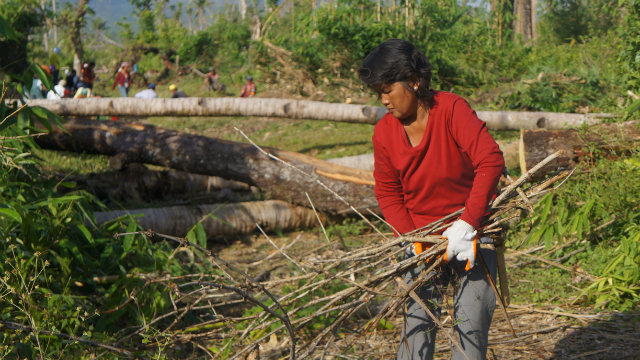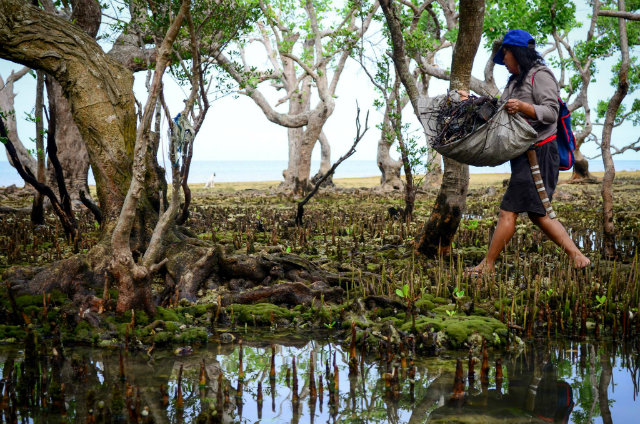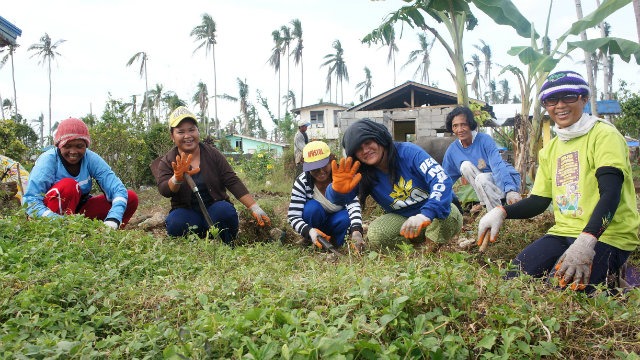SUMMARY
This is AI generated summarization, which may have errors. For context, always refer to the full article.

LEYTE, Philippines – Forty-year-old Nenita Estorico has been a coconut farmer for more than 15 years.
For many farmers in the Philippines, they regard the coconut as a “tree of life” because most parts of it can be a product – oil, lumber, wine, juice, coal, and even herbal medicine.
Unfortunately, when Super Typhoon Yolanda (Haiyan) ravaged Visayas in November 14, coconut farmers like Nenita felt so desperate. They depended much on the coconut trees as their main source of income.
“The typhoon destroyed our livelihood, including our homes. How can I sustain my family now?” Nenita asked. (READ: Hungry, homeless, jobless after Yolanda)
Nenita is also a single mother of 6 children. She has been separated from her husband for over 5 years now.
“It’s tough to be the sole breadwinner. And now, the coconuts are gone,” Nenita whispered.
Coconut farming
Coconut farming is a very important source of economic activity among farmers across Leyte and Samar islands.
About 80% of rural farmers are engaged in coconut farming. (READ: PH agriculture)
The government estimated that around 33 million coconut trees were damaged by the typhoon, affecting 340,000 of Leyte’s farmers.
“It will take an average of 8 years for coconut trees to re-grow and for the farmers to fully recover their livelihood again,” Patricio Agustin, Livelihood Advisor of World Vision Haiyan Emergency Response, explained.
Agustin added that there are quite a number of tenant farmers, who are considered as the most vulnerable groups in rural areas. Nenita, a single mom and a coconut farmer, is one of them.
Despite the hardships, Nenita is staying stronger for her children.
“I need to find a job. I have to support my children,” she said.
Livelihood restoration

Besides the enormous shelter requirements after Yolanda, millions of people in Yolanda-affected areas also need support for food security and livelihood restoration.
Nenita is part of World Vision’s Cash for Work project at her village in the town of Dagami. The activity facilitates the recovery of livelihood assets and rehabilitate community infrastructure affected communities.
Aside from men, many women, wives, and mothers have given this opportunity to earn a daily income through Cash for Work.
Longer trek
The project targets to employ 8,500 most vulnerable people in 90 barangays (villages) in the provinces of Leyte and Panay.
Workers do debris clearing, tree planting, school and backyard gardening, riverbank stabilization, and road and irrigation rehabilitation.

“We’re clearing the road going to our village. These days, our kids are taking a longer and more risky trek since the main road was blocked with coconut trees,” Nenita said.
In another village of Dagami, a team of workers were putting up a fence within a community garden in order to protect the plants from stray animals. In a nearby village, workers were doing a river clean-up.
“I’m thankful to earn income and help my community at the same time. If the road will be cleared and cleaned up, my kids can access a safe way going to school. The income can support my kids’ education too,” she added.
Nenita and other workers get P260 pesos for 4 hours of labor per day, 10 days per cycle – in accordance with the minimum daily wage in Leyte.
“World Vision aims to target 14, 000 families in the provinces of Leyte, Panay, and North Cebu to provide assistance on shelter, livelihood, restoration of water facilities, health projects, and assistance to the education of children,” says Ajab-Aram Macapagat, Zonal Manager in Eastern Leyte.
Risk reduction
Ajab added that another target of the response is to strengthen local capacity for Disaster Risk Reduction (DRR).
“Our response is a holistic approach. And we consult the community and the local government in all our interventions,” Ajab added.
Nenita is hopeful that in the coming months, she can be involved into livestock and vegetable farming.
“I look forward to planting vegetable and raise farm animals like pigs and chicken,” Nenita shared.
“As long as I’m alive, I am determined to work hard to give a good future for my children.” – Rappler.com
Crislyn Felisilda is World Vision’s Field Communication Officer. She has been with Haiyan Response since November 2013.
Add a comment
How does this make you feel?
There are no comments yet. Add your comment to start the conversation.